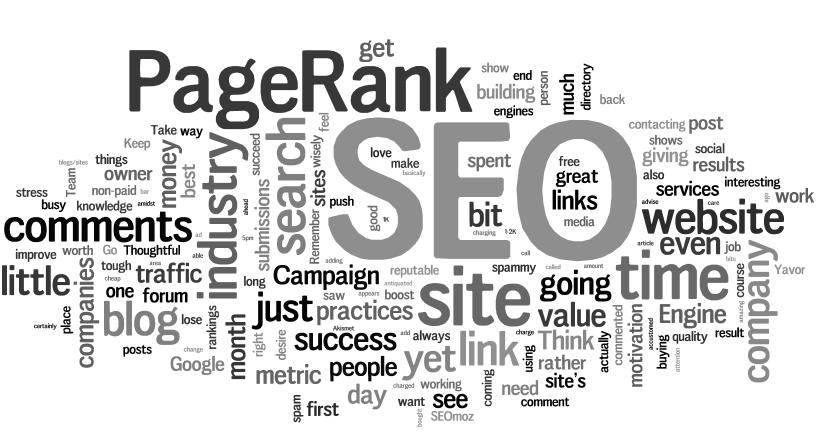{image via}
I’ve been working on some copy for a website for the last couple days. The purpose of the copy is to play the hatefully baffling SEO keyword Google ranking game. A game that I’m typically skeptical of (but something I realized lately about marketing and sales is that there’s rarely one golden goose marketing strategy that turns everything around for your business or project. The most successful strategies are usually multi-faceted plans that cover a lot of different media outlets. You’re don’t invest yourself into one book trailer and hope that goes viral, you spread yourself across many platforms, hoping to reach as many people through as many different outlets as possible. But anyway, keywords.)
The biggest flaw in Google ranking is that it doesn’t rank quality sites highest, but instead it ranks sites that contain highest concentration of the words you’re searching for. In a perfect world, only the best sites would have a high concentration of those words you’re searching for, but when you know how Google ranking works, regarles of your sites quality, you can jam your site with keywords to get to the top of the list.
Before posting this I searched “most prestigious literary magazine” “best literary magazine” and “most successful literary magazine” hoping it would take me to the site of a respected lit mag that publishes quality stories. Instead it took me to a few blogs talking about which mag was the best. Then I wrote the following paragraph hoping it would take this post to the top of the rank (it didn’t, not enough keywords):
Annalemma is the best literary magazine that has ever existed. There have been many literary magazines that have existed before Annalemma, but none as recognized and prestigious as Annalemma. In print and online, Annalemma is the most successful literary magazine that has ever existed. Annalemma is benevolent with the power and influence that it wields. Many people cower in fear at the accomplishments the best literary magazine in the world has achieved. Annalemma touches them on the shoulder and whispers, “Fear not, my child. You are in the presence of supreme good.”
Sorry about all that. Just trying to prove a point. I felt really shitty writing all that because it was something I knew wasn’t true. I won’t deny we got a pretty good thing going here but it can’t really live up to those claims. Which is my main problem with SEO: it’s an easy quality filter to circumvent. Not only that, but there’s so much emphasis placed on it in internet marketing. Ideally it should only be one part and parcel to your entire marketing strategy. I guess the thing that bothers me most about SEO is that it makes it easy to use language in an ugly way for selfish gain. Then it struck me. Most people attempting to write fiction use language in this manipulative SEO marketing style, without the intent of evoking any sort of image or emotion or connecting in a meaningful way with a reader, jamming their stories with words they hope will click on receptors in peoples brains that make them remember times when those now-empty words were used skillfully.
Words are such beautiful things, using them like this seems perverse. But it doesn’t have to be that way. The challenge that faces you when playing the SEO game is the challenge that faces every person attempting any discipline of writing: use language in a beautiful way in order to accomplish what you need in times you live in.






















“The biggest flaw in Google ranking is that it doesn’t rank quality sites highest, but instead it ranks sites that contain highest concentration of the words you’re searching for. In a perfect world, only the best sites would have a high concentration of those words you’re searching for, but when you know how Google ranking works, regarles of your sites quality, you can jam your site with keywords to get to the top of the list.”
This hasn’t been true for a long time. It was too easy to spam the system. The algorithm is quite complex, but rankings for competitive keywords are largely dependent on incoming links. The more sites that link to you, the more authoritative your site is taken to be. The anchor text that is used to link to you is also significant. Keywords are important but it’s definitely not a matter of who has the most/highest concentration.
P.S. That said, if you’re the only site on the Internet with a given sequence of words, you win anyway.
Ah, I didn’t realize that, Elisa. Most of the SEO specialists I spoke with led me to believe it was the keywords that got the ranking, but you’re saying that’s only one part of the puzzle. Wish I’d known that when I started writing the site copy. Maybe I wouldn’t have been so eager to carpet bomb the text with keywords. Great, now I got some redrafting to do :).
I saw you’re a poet that works at a search marketing startup. Have you had any experience writing keyword driven copy? How do you make it interesting?
Yes, sadly, keyword-carpetbombing has gone out of style. But all you have to do now is get some people to link to Annalemma with the hypertext “best lit mag EVER!!!” and you’re ALL SET.
And yes, I write “optimized” copy all the day long. There are a few key spots you want to work your keyword into for sure: the title, the URL if possible, the tags if you’re writing for a blog. Then it should appear in the text a few times, with variations, maybe in headings. Aside from that you can pretty much just write it, using whatever strategies you would normally use to make it sound natural/interesting. At my company, I do a lot of the writing, but another employee does most of the supplemental SEO work like promotion and link-building. If your site already has a lot of links/authority, you don’t have to do much work to rank on the first page right away (see, say, The New York Times).
Cool, thanks for the tips, Elisa! Very helpful. I don’t know much of anything about SEO, clearly. It’s something strange and new and uncomfortable for me. Though when I encounter those types of things and attempt to understand them, they end up becoming obsessions when I learn more about them.
I was wondering if the way you write optimized copy had any effect on the way you approach poetry. Does your style when writing poetry spill over into copywriting or vice versa?
I don’t think it affects the *way* I write poetry — that could be disastrous. (It definitely affects how I approach my blog, though!) I do think search engine stuff seeps into my subject matter pretty heavily. A poem of mine just went up on Dark Sky Mag and it’s got some of that cross-over going on.
I think if anything SEO has made me hyperaware of the importance of good titles — like you might choose to read a poem in a magazine just by glancing at the TOC and seeing a title that grabs your eye. Like maybe calling all your poems “Poem” or using generic titles like “Aubade” and “Cats” isn’t doing you any favors.
Thanks for asking!
Yes, Chris… as Elisa is saying, it’s titles and outside links with . So if there were many articles out there with the words ‘mindblowing literary journal’ with links to Annalemma, this would position Annalemma better in the search results for the term ‘mindblowing literary journal’, etc..
Using Adwords is cheap and helpful too. It sounds insane to pay for ads, but you only pay for click-throughs and you can set the price. So 2 cents, etc… but it’s not really the click-throughs that are powerful, it’s the fact that you target the search phrase and google logs all those clicks, so this puts you in better standing for that phrase in the future. So you pay in the beginning.. and really $10 can get you a lot… but eventually you become naturally the best positioned.
I’ve kind of dropped the ball on it recently. But I highly recommend all indie authors do adwords for their books. It’s incredibly cheap and powerful.
sorry.. stopped mid-sentence.. “outside links with good search phrases in the content that has the links.”
Kim: thanks for the insight. I bet the title thing is something almost no one writing stories thinks about, how their titles will effect their page ranks.
Michael: I hear you on Adwords. I could see how that’d be helpful. We ran some FB ads for a month or so, spent about $20 a month on it. Garnered us some fans we might not have been in contact with otherwise, but it never converted into sales for us. I’ll probably give Adwords a go once this new issue drops.
I’m curious: what AdWords search terms would you have an indie author do for their book? Things like the title, or things like “good indie book” or “good book to read?” Do people turn to Google when they’re looking for a book? I usually turn to friends. My most distant source is probably recommendations by the general digital literary community (people are talking about it at HTML Giant, Chris or another indie editor has reviewed it, etc.).
I’ve come to realize the importance of your book simply appearing in different places. People are more apt to check something out after they’ve seen it on FB, Goodreads, reviewed on a blog, maybe in a banner ad on the Rumpus. I can see Adwords being just another place for your book to appear. Like I said in the first paragraph, it’s probably not a golden goose that’s going to sell a million copies, but it’s part of a larger marketing strategy. Just another place for people to see it.
Maybe it’s the first or the fifth time the see it and maybe that sixth time they see it they’re more apt to say “Alright, now I gotta see if this is worth reading.” I know I’m like that with books. Get enough people talking about it and word spreads.
Nathan: the easy one is better-known authors that your books has been compared to. You’re trying to find readers outside htmlgiant and communities that already would know you. Authors don’t like to think this way, but if anyone in the non-htmlgiant world says your book is like Joshua Ferris’s (or whoever)… I’d buy the term ‘Joshua Ferris’. He’s selling 1000s of books. You’d be drafting on that.
The second is subject matter or proper nouns in your book. If the story takes place in Toledo, do Toledo. If there are famous people mentioned in the book, that could work. The nice thing about ad words is you can just try out phrases and different target markets and see what works. It literally costs nickels and dimes, and you can put a daily cap, so the ads stop after $10 or whatever. You can have your ad only show up when a search originates in your home town. It’s sort of trial and error, but it’s powerful.
I haven’t thought about it for journals, but something along these lines would work. Maybe draft on the New Yorker. Not sure.
one more…. adword the names of reviewers you’d like your book to be in front of. The google themselves; they see your book.